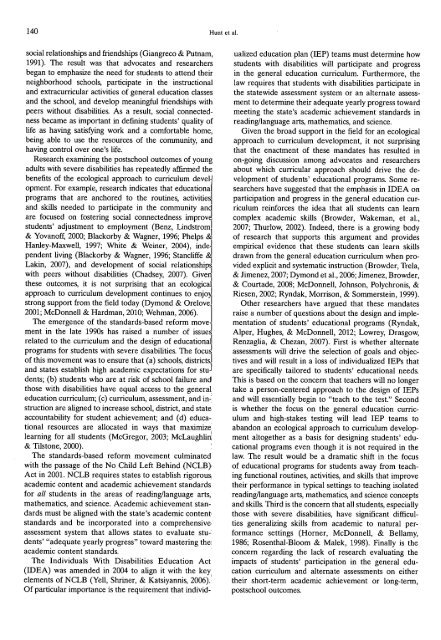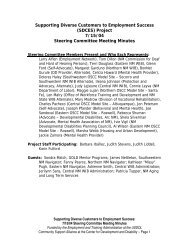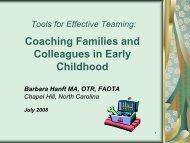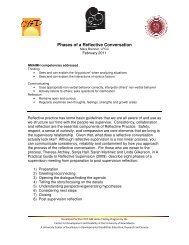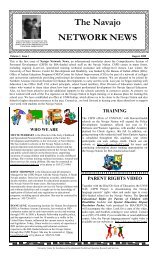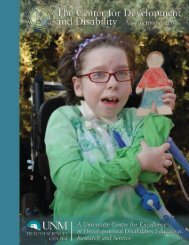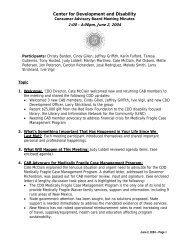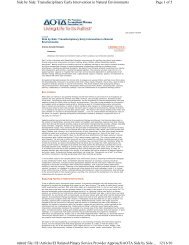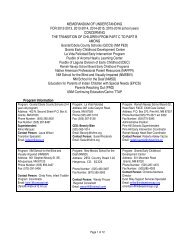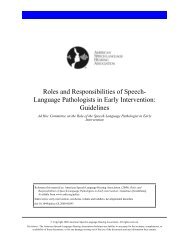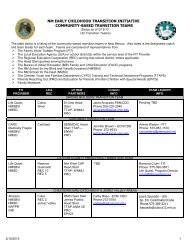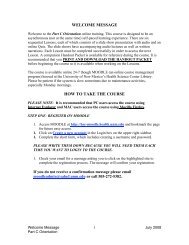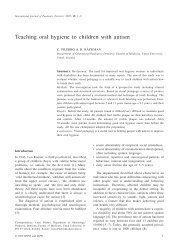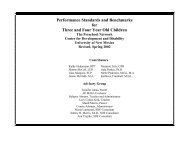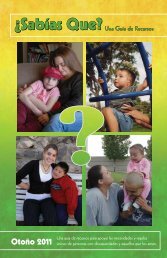Reconciling an Ecological Curricular Framwork Focusing on Quality ...
Reconciling an Ecological Curricular Framwork Focusing on Quality ...
Reconciling an Ecological Curricular Framwork Focusing on Quality ...
Create successful ePaper yourself
Turn your PDF publications into a flip-book with our unique Google optimized e-Paper software.
140 Hunt et al.<br />
social relati<strong>on</strong>ships <str<strong>on</strong>g>an</str<strong>on</strong>g>d friendships (Gi<str<strong>on</strong>g>an</str<strong>on</strong>g>greco & Putnam,<br />
1991). The result was that advocates <str<strong>on</strong>g>an</str<strong>on</strong>g>d researchers<br />
beg<str<strong>on</strong>g>an</str<strong>on</strong>g> to emphasize the need for students to attend their<br />
neighborhood schools, participate in the instructi<strong>on</strong>al<br />
<str<strong>on</strong>g>an</str<strong>on</strong>g>d extracurricular activities of general educati<strong>on</strong> classes<br />
<str<strong>on</strong>g>an</str<strong>on</strong>g>d the school, <str<strong>on</strong>g>an</str<strong>on</strong>g>d develop me<str<strong>on</strong>g>an</str<strong>on</strong>g>ingful friendships with<br />
peers without disabilities. As a result, social c<strong>on</strong>nectedness<br />
became as import<str<strong>on</strong>g>an</str<strong>on</strong>g>t in denning students' quality of<br />
ufe as having satisfying work <str<strong>on</strong>g>an</str<strong>on</strong>g>d a comfortable home,<br />
being able to use the resources of the community, <str<strong>on</strong>g>an</str<strong>on</strong>g>d<br />
having c<strong>on</strong>trol over <strong>on</strong>e's life.<br />
Research examining the posfschool outcomes of young<br />
adults with severe disabilities has repeatedly affirmed the<br />
benefits of the ecological approach to curriculum devel-j<br />
opment. For example, research indicates that educati<strong>on</strong>al<br />
programs that are <str<strong>on</strong>g>an</str<strong>on</strong>g>chored to the routines, activities<br />
<str<strong>on</strong>g>an</str<strong>on</strong>g>d skills needed to participate in the community <str<strong>on</strong>g>an</str<strong>on</strong>g>d<br />
are focused <strong>on</strong> fostering social c<strong>on</strong>nectedness improve<br />
students' adjustment to employment (Benz, Lindstrom<br />
& Yov<str<strong>on</strong>g>an</str<strong>on</strong>g>off, 2000; Blackorby & Wagner, 1996; Phelps d<br />
H<str<strong>on</strong>g>an</str<strong>on</strong>g>ley-Maxwell, 1997; White & Weiner, 2004), indej<br />
pendent living (Blackorby & Wagner, 1996; St<str<strong>on</strong>g>an</str<strong>on</strong>g>cliffe 8¿<br />
Lakin, 2007), <str<strong>on</strong>g>an</str<strong>on</strong>g>d development of social relati<strong>on</strong>ships<br />
with peers without disabilities (Chadsey, 2007). Given!<br />
these outcomes, it is not surprising that <str<strong>on</strong>g>an</str<strong>on</strong>g> ecological<br />
approach to curriculum development c<strong>on</strong>tinues to enjo><br />
str<strong>on</strong>g support from the field today (Dym<strong>on</strong>d & Orelove,<br />
2001; McD<strong>on</strong>neU & Hardm<str<strong>on</strong>g>an</str<strong>on</strong>g>, 2010; Wehm<str<strong>on</strong>g>an</str<strong>on</strong>g>, 2006).<br />
The emergence of the st<str<strong>on</strong>g>an</str<strong>on</strong>g>dards-based reform movement<br />
in the late 1990s has raised a number of issue:<br />
related to the curriculum <str<strong>on</strong>g>an</str<strong>on</strong>g>d the design of educati<strong>on</strong>;<br />
programs for students with severe disabilities. The focu<br />
of this movement was to ensure that (a) schools, districts,<br />
<str<strong>on</strong>g>an</str<strong>on</strong>g>d states establish high academic expectati<strong>on</strong>s for stu<br />
dents; (b) students who are at risk of school failure <str<strong>on</strong>g>an</str<strong>on</strong>g>d<br />
those with disabilities have equal access to the general<br />
educati<strong>on</strong> curriculum; (c) curriculum, assessment, <str<strong>on</strong>g>an</str<strong>on</strong>g>d instructi<strong>on</strong><br />
are aligned to increase school, district, <str<strong>on</strong>g>an</str<strong>on</strong>g>d state<br />
accountability for student achievement; <str<strong>on</strong>g>an</str<strong>on</strong>g>d (d) educati<strong>on</strong>al<br />
resources are allocated in ways that maximize<br />
learning for all students (McGregor, 2003; McLaughlin<br />
& Tilst<strong>on</strong>e, 2000).<br />
The st<str<strong>on</strong>g>an</str<strong>on</strong>g>dards-based reform movement culminated<br />
with the passage of the No Child Left Behind (NCLB)<br />
Act in 2001. NCLB requires states to establish rigorousi<br />
academic c<strong>on</strong>tent <str<strong>on</strong>g>an</str<strong>on</strong>g>d academic achievement st<str<strong>on</strong>g>an</str<strong>on</strong>g>dards<br />
for all students in the areas of reading/l<str<strong>on</strong>g>an</str<strong>on</strong>g>guage arts,<br />
mathematics, <str<strong>on</strong>g>an</str<strong>on</strong>g>d science. Academic achievement st<str<strong>on</strong>g>an</str<strong>on</strong>g>dards<br />
must be aligned with the state's academic c<strong>on</strong>tent<br />
st<str<strong>on</strong>g>an</str<strong>on</strong>g>dards <str<strong>on</strong>g>an</str<strong>on</strong>g>d be incorporated into a comprehensive<br />
assessment system that allows states to evaluate students'<br />
"adequate yearly progress" toward mastering the:<br />
academic c<strong>on</strong>tent st<str<strong>on</strong>g>an</str<strong>on</strong>g>dards.<br />
The Individuals With Disabilities Educati<strong>on</strong> Act<br />
(IDEA) was amended in 2004 to align it with the key<br />
elements of NCLB (Yell, Shriner, & Katsiy<str<strong>on</strong>g>an</str<strong>on</strong>g>nis, 2006).<br />
Of particular import<str<strong>on</strong>g>an</str<strong>on</strong>g>ce is the requirement that individ-<br />
ualized educati<strong>on</strong> pl<str<strong>on</strong>g>an</str<strong>on</strong>g> (IEP) teams must determine how<br />
students with disabilities will participate <str<strong>on</strong>g>an</str<strong>on</strong>g>d progress<br />
in the general educati<strong>on</strong> curriculum. Furthermore, the<br />
law requires that students with disabilities participate in<br />
the statewide assessment system or <str<strong>on</strong>g>an</str<strong>on</strong>g> alternate assessment<br />
to determine fheir adequate yearly progress toward<br />
meeting the state's academic achievement st<str<strong>on</strong>g>an</str<strong>on</strong>g>dards in<br />
reading/l<str<strong>on</strong>g>an</str<strong>on</strong>g>guage arts, mathematics, <str<strong>on</strong>g>an</str<strong>on</strong>g>d science.<br />
Given the broad support in the field for <str<strong>on</strong>g>an</str<strong>on</strong>g> ecological<br />
approach to curriculum development, if not surprising<br />
that the enactment of these m<str<strong>on</strong>g>an</str<strong>on</strong>g>dates has resulted in<br />
<strong>on</strong>-going discussi<strong>on</strong> am<strong>on</strong>g advocates <str<strong>on</strong>g>an</str<strong>on</strong>g>d researchers<br />
about which curricular approach should drive the development<br />
of students' educati<strong>on</strong>al programs. Some researchers<br />
have suggested that the emphasis in IDEA <strong>on</strong><br />
participati<strong>on</strong> <str<strong>on</strong>g>an</str<strong>on</strong>g>d progress in the general educati<strong>on</strong> curriculum<br />
reinforces the idea fhaf all students c<str<strong>on</strong>g>an</str<strong>on</strong>g> leam<br />
complex academic skills (Browder, Wakem<str<strong>on</strong>g>an</str<strong>on</strong>g>, et al.,<br />
2007; Thurlow, 2002). Indeed, there is a growing body<br />
of research that supports this argument <str<strong>on</strong>g>an</str<strong>on</strong>g>d provides<br />
empirical evidence that these students c<str<strong>on</strong>g>an</str<strong>on</strong>g> learn skiUs<br />
drawn from the general educati<strong>on</strong> curriculum when provided<br />
explicit <str<strong>on</strong>g>an</str<strong>on</strong>g>d systematic instructi<strong>on</strong> (Browder, Trela,<br />
& Jimenez, 2007; Dym<strong>on</strong>d et al., 2006; Jimenez, Browder,<br />
& Courtade, 2008; McD<strong>on</strong>nell, Johns<strong>on</strong>, Polychr<strong>on</strong>is, &<br />
Riesen, 2002; Ryndak, Morris<strong>on</strong>, & Sommerstein, 1999).<br />
Other researchers have argued that these m<str<strong>on</strong>g>an</str<strong>on</strong>g>dates<br />
raise a number of questi<strong>on</strong>s abouf the design <str<strong>on</strong>g>an</str<strong>on</strong>g>d implementati<strong>on</strong><br />
of students' educati<strong>on</strong>al programs (Ryndak,<br />
Alper, Hughes, & McD<strong>on</strong>nell, 2012; Lowrey, Drasgow,<br />
Renzaglia, & Chez<str<strong>on</strong>g>an</str<strong>on</strong>g>, 2007). First is whether alternate<br />
assessments will drive the selecti<strong>on</strong> of goals <str<strong>on</strong>g>an</str<strong>on</strong>g>d objectives<br />
<str<strong>on</strong>g>an</str<strong>on</strong>g>d will result in a loss of individualized IEPs that<br />
are specifically tailored to students' educati<strong>on</strong>al needs.<br />
This is based <strong>on</strong> fhe c<strong>on</strong>cem that teachers will no l<strong>on</strong>ger<br />
take a pers<strong>on</strong>-centered approach fo the design of IEPs<br />
<str<strong>on</strong>g>an</str<strong>on</strong>g>d will essenfially begin to "teach fo the test." Sec<strong>on</strong>d<br />
is whether fhe focus <strong>on</strong> fhe general educafi<strong>on</strong> curriculum<br />
<str<strong>on</strong>g>an</str<strong>on</strong>g>d high-stakes testing will lead IEP teams fo<br />
ab<str<strong>on</strong>g>an</str<strong>on</strong>g>d<strong>on</strong> <str<strong>on</strong>g>an</str<strong>on</strong>g> ecological approach fo curriculum development<br />
altogether as a basis for designing studenfs' educafi<strong>on</strong>al<br />
programs even fhough it is not required in fhe<br />
law. The result would be a dramatic shift in fhe focus<br />
of educati<strong>on</strong>al programs for sfudenfs away from teaching<br />
functi<strong>on</strong>al routines, activities, <str<strong>on</strong>g>an</str<strong>on</strong>g>d skills that improve<br />
fheir perform<str<strong>on</strong>g>an</str<strong>on</strong>g>ce in typical settings fo teaching isolated<br />
reading/l<str<strong>on</strong>g>an</str<strong>on</strong>g>guage arfs, mafhemafics, <str<strong>on</strong>g>an</str<strong>on</strong>g>d science c<strong>on</strong>cepts<br />
<str<strong>on</strong>g>an</str<strong>on</strong>g>d skills. Third is fhe c<strong>on</strong>cern fhaf all studenfs, especially<br />
those with severe disabilities, have signific<str<strong>on</strong>g>an</str<strong>on</strong>g>t difficulties<br />
generalizing skills from academic fo natural perform<str<strong>on</strong>g>an</str<strong>on</strong>g>ce<br />
settings (Homer, McD<strong>on</strong>neU, & Bellamy,<br />
1986; Rosenthal-Bloom & Malek, 1998). Finally is fhe<br />
c<strong>on</strong>cem regarding fhe lack of research evaluating fhe<br />
impacts of students' participati<strong>on</strong> in the general educati<strong>on</strong><br />
curriculum <str<strong>on</strong>g>an</str<strong>on</strong>g>d alfernafe assessments <strong>on</strong> either<br />
fheir short-term academic achievement or l<strong>on</strong>g-term,<br />
posfschool oufcomes.


